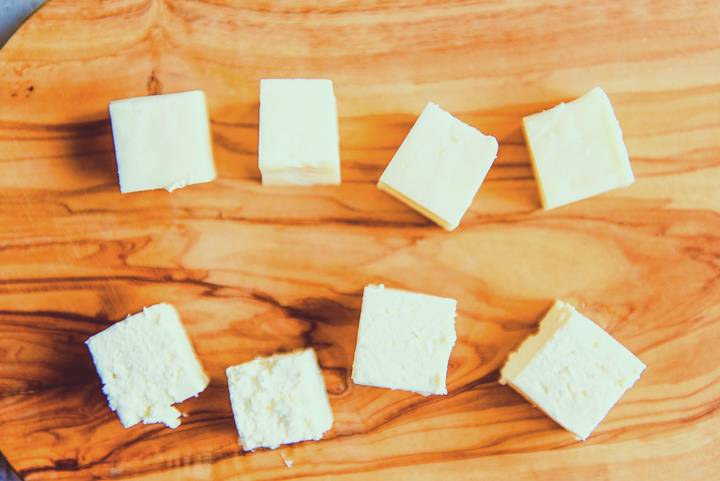7 Health Benefits of Cottage Cheese | Health Benefits of Eating Paneer

Paneer, a versatile Indian cheese, offers a plethora of health benefits, making it a valuable addition to various diets. Let’s delve into the nutritional richness and health advantages of incorporating paneer into your meals.
7 Paneer Health Benefits
Good source of protein
Paneer is a good source of protein especially for vegetarians who do not get their intake from meat products. 100 gm of paneer yields about 18 gm of protein which is good for people who weight train as they need protein for muscle building and repair. Apart from this, proteins are loaded with a wide range of health benefits.
Boosts immunity
The human body remains immune because of the antibodies which detect the disease and fights it. The antibodies are a specific type of protein.
You get all these benefits from the dairy product as it is one protein rich vegetarian food. Today it’s also very convenient to buy paneer online. Apart from convenience, there also are other benefits which you get from paneer online shopping
Promote Bone Health
Thanks to calcium found in cottage cheese nutrition, this healthy food improves the bone health. According to a recent study, there is a close association between high intake of calcium and bone density improvement. Cottage cheese can provide 8 percent of an ordinary person’s daily need of calcium.
Improves Digestion.
Another benefit of paneer is that it can aid digestion. Cottage cheese contains a good amount of phosphorus that helps with digestion and throwing out waste from the body. It also contains magnesium that prevents the problem of constipation by having a laxative effect. Those with irregular bowel movements can particularly benefit from eating paneer, as it makes the waste pass easily through the intestines.
Maintains Blood Sugar Levels.
Cottage cheese can help regulate blood sugar levels too. Cottage cheese is packed with magnesium which can not only check the untimely spikes but also ensure better heart health and immune system.
Good for Heart Health.
Cottage cheese can do wonders for your heart health too. Paneer contains potassium which has been known to play a key role in fluid balance of body. Your kidneys play a crucial role in managing your blood pressure by controlling the amount of fluid stored in your body.
Rich Source of Folates
Cottage cheese contains folates, a B-complex vitamin that is required for pregnant mothers. Folates is an essential vitamin which helps in foetal development and plays a crucial part in producing the red blood cells.
Is It Good to Eat Paneer Daily?
Incorporating paneer, a popular Indian cheese, into your daily diet can have both advantages and considerations. Let’s explore the pros and cons.
| Aspect | Evaluation |
|---|---|
| Nutrient Content | Paneer is rich in protein, calcium, and vitamins. It can be a valuable addition to a balanced diet. |
| Caloric Density | Moderation is key; paneer is calorie-dense. Consuming it in excess may contribute to weight gain. |
| Protein Source | For vegetarians, paneer is a valuable protein source. It aids muscle development and overall health. |
| Calcium Benefits | Paneer supports bone health due to its calcium content. Daily intake can benefit those with calcium deficiencies. |
Is Paneer Healthy or Fat?
Paneer contains fats, but it’s not inherently unhealthy. The type and quantity of fats matter.
| Type of Fat | Evaluation |
|---|---|
| Saturated Fat | Paneer has saturated fats. While not all saturated fats are harmful, moderation is advised for a heart-healthy diet. |
| Protein Content | The protein in paneer promotes satiety and muscle health, making it a nutritious option when consumed mindfully. |
Health Side Effects of Paneer
While paneer is generally considered healthy, excessive consumption may have some side effects.
| Side Effect | Consideration |
|---|---|
| Weight Gain | High-calorie content may contribute to weight gain if consumed in excess. |
| Digestive Issues | Some individuals may experience digestive discomfort due to the fat content. |
| Lactose Intolerance | Individuals with lactose intolerance may need to limit paneer intake. |
| Sodium Concerns | Watch sodium levels, especially if using store-bought paneer, as it may contain added salt. |
Paneer: Junk Food or Not?
Paneer itself is not a junk food; it’s a dairy product rich in nutrients. However, its preparation and accompaniments matter.
| Consideration | Evaluation |
|---|---|
| Preparation Style | Fried or heavily spiced paneer dishes may compromise health benefits. Opt for grilled or lightly cooked options. |
| Accompaniments | Pairing with healthy sides like vegetables enhances the nutritional profile. Be cautious with calorie-dense accompaniments. |
| Mindful Consumption | Enjoy paneer in moderation as part of a balanced diet. Avoid excessive intake of fried or high-calorie paneer dishes. |
In conclusion, paneer can be a wholesome part of your daily diet when consumed mindfully. Consideration of portion sizes, cooking methods, and overall dietary balance is key to enjoying its nutritional benefits without adverse effects. As with any dietary choice, it’s advisable to consult with a healthcare professional or nutritionist for personalized guidance.